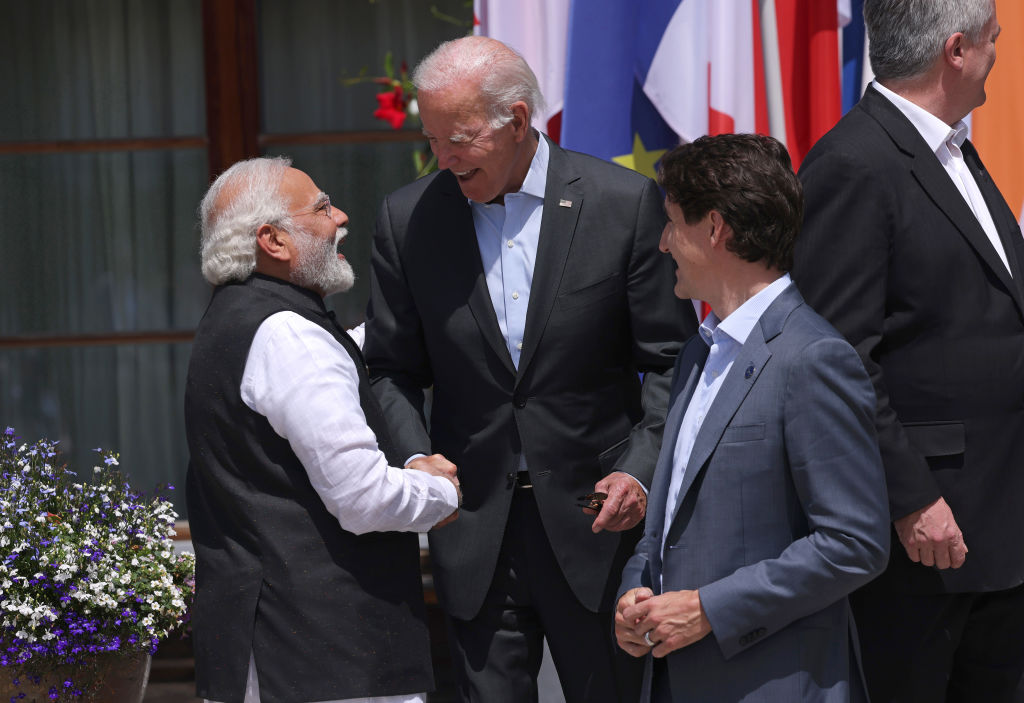- Tuesday, April 22, 2025
Michael Rubin compared Canada with an “ant” and India with an “elephant” to describe to the ongoing row and said India is more important than Canada in strategic terms.

By: Shubham Ghosh
SUGGESTING that the US has decided on who to pick in the ongoing diplomatic row between India and Canada, Michael Rubin, a former official of Pentagon, has said the allegations brought against India by the Canadian government led by prime minister Justin Trudeau have led to “greater danger” to Ottawa than New Delhi.
He also said if the US were to choose between Canada and India, it would go for the latter as their relationship is “too important”.
He even compared Canada with an “ant” and India with an “elephant” to describe the ongoing row and said India is more important than Canada in strategic terms. He said Ottawa picking up a fight with New Delhi is like “an ant picking up a fight against an elephant”.
#WATCH | Washington, DC | On allegations by Canada, Michael Rubin, former Pentagon official and a senior fellow at the American Enterprise Institute says, "… I suspect that the United States doesn't want to be pinned in the corner to choose between 2 friends, but if we have to… pic.twitter.com/tlWr6C6p7e
— ANI (@ANI) September 23, 2023
Rubin also spoke about Trudeau’s poor approval ratings and predicted that the latter might not be in office for long and the US could rebuild the relationship with its northern neighbour after he exits.
“I suspect that the United States doesn’t want to be painted a corner to choose between two friends. But if we have to choose between two friends, increasingly we’re going to choose India on this matter, simply because Nijjar was a terrorist, and India is too important. Our relationship is too important,” Rubin told Asian News International.
Rubin, who is a specialist on Iran, Turkey and South Asia, said while speaking on the possibility of the US publicly intervening in the matter between two of his allies, “Frankly, there’s a much greater danger for Canada than India. If Canada wants to pick a fight, frankly, at this point, it’s like an ant picking a fight against an elephant, and the fact that matter is India is the world’s largest democracy. It’s far more important strategically, arguably than Canada is, especially as concern grows with regard to China and other matters in the Indian Ocean basin, and in the Pacific.”
Taking on Trudeau, Rubin said the former made a “huge mistake” as he brought the allegations that he could not back with evidence. “Either he was shooting from the hip and he doesn’t have the evidence to support the accusations he made against the government. There is something there, in which case he needs to explain why this government was sheltering a terrorist,” Rubin added.
A diplomatic row erupted this week after Trudeau accused the Indian government of being involved in the killing of Sikh separatist leader Hardeep Singh Nijjar, designated as terrorist by New Delhi, outside a gurdwara in Surrey in British Columbia in June. India called the charges “absurd” and “motivated” and the matter even escalated to expulsion of each other’s diplomats by both sides and India suspending issuing visas to Canadians willing to travel to the south Asian nation.
Rubin said as a former consumer of intelligence, he could say that often, the intelligence that is seen is not in black and white.
“When you have a situation like this, perhaps prime minister Trudeau raised the issue, but there wasn’t necessarily consensus on what he meant. And regardless, let’s not fool ourselves, Nijjar was not simply a plumber, any more than Osama bin Laden was a construction engineer. He had blood on his hands from multiple attacks,” Rubin added.
Saying the Canadian premier went “too far”, a viewpoint he said was harboured by many in the security communities of the US and Canada, Rubin said Trudeau was playing domestic politics since he is struggling in his re-election campaign and Sikh activists are key in a number of swing districts. He called the Canadian leader short-sighted who was acting as a politician.
“No one should trade their short-term political convenience for the long-term relationship with the world’s largest democracy,” Rubin added.